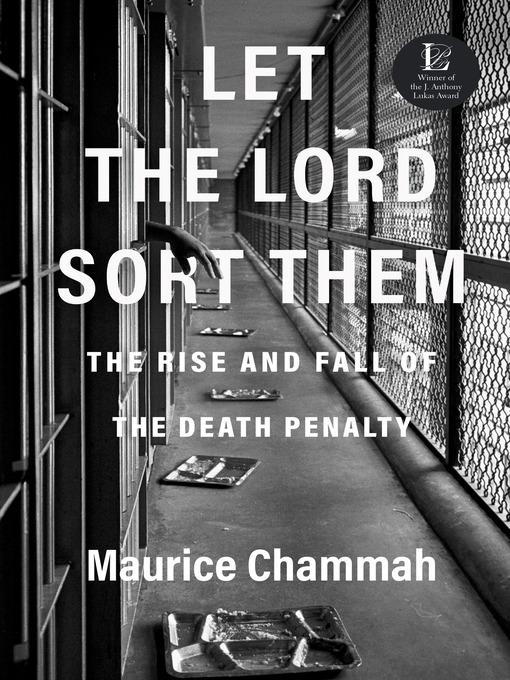
Let the Lord Sort Them
The Rise and Fall of the Death Penalty
کتاب های مرتبط
- اطلاعات
- نقد و بررسی
- دیدگاه کاربران
نقد و بررسی

October 5, 2020
Journalist Chammah debuts with a nuanced and deeply reported account of evolving attitudes toward the death penalty in America. Focusing on Texas, Chammah describes how pride in the state’s “frontier” brand of justice, coupled with a requirement that juries consider a defendant’s “future dangerousness” in capital cases, have led to more than 500 of the roughly 1,500 executions carried out in the U.S. since the 1970s taking place in Texas. He revisits headline-grabbing executions (Cameron Todd Willingham, Karla Faye Tucker, Gary Graham); reviews Supreme Court decisions prohibiting the death sentence for juveniles and the intellectually disabled; and discusses the history of “racially motivated lynchings.” The book weighs the human toll of the death penalty through profiles of defense lawyers, prosecutors, and judges; wardens, guards, and prison chaplains who oversee executions; death row inmates; and, to a lesser extent, the families of victims. Chammah complements his wide-angled perspective with deep dives into such specifics as the process of obtaining execution drugs, though readers may lose track of the many different cases and political and legislative battles he chronicles. Still, this is a thorough, finely written, and unflinching look at one of the most controversial aspects of the American justice system.

October 15, 2020
Chammah, an Austin-based journalist for The Marshall Project, provides this nuanced look at the complex history of the death penalty with a focus on Texas, tracing political and cultural shifts in opinion on the punishment's validity. Following a major Supreme Court case in 1972 that declared death penalty laws unconstitutional due to clear racial disparities, states had to rewrite legislation around capital sentences to make outcomes less arbitrary. That pivotal case set the stage for decades of debate between pro- and anti-death penalty advocates on whether capital punishment was justifiable or necessary. Chammah follows the careers of defense attorney Danalynn Recer and prosecutor Elsa Alcala to illustrate the death penalty's ongoing evolution. He situates Texas' approach to capital punishment in the context of both the state's frontier mythology and its history of lynching and racial violence. Chammah includes perspectives from many sides of death penalty cases, from victims' families to the warden in the execution room. His outstanding storytelling and thorough research make this an excellent analysis of modern legal and criminal-justice history.(Reprinted with permission of Booklist, copyright 2020, American Library Association.)

November 15, 2020
The evolution of capital punishment in America. Austin-based journalist Chammah, a staff writer for the Marshall Project, effectively splits his report between a history of the death penalty and its incremental downfall in recent decades. He focuses predominantly on Texas, an ultraconservative state at the epicenter of the debate, and examines how public opinion has shifted to embrace other punishments, such as life without parole. The author first charts the historical rise of executions from the early 1970s, corresponding with a dramatic rise in violent crime. In Texas, the political conversation has been focused on the types of crime that warrant it as well as consideration of a defendant's "future dangerousness." The state's long history of "frontier justice" has meant that "of the roughly fifteen hundred executions that Americans have carried out since the 1970s, Texas has been responsible for more than five hundred." Chammah profiles several key figures, including Elsa Alcala, a former assistant district attorney and judge on the Texas Court of Criminal Appeals; and Danalynn Recer, a lawyer and prominent death penalty opponent. In dramatic fashion, the author also interweaves details about high-profile capital crime cases. Among others, he thoroughly examines the executions of Karla Faye Tucker (1998) and Shaka Sankofa (2000), looking at the cases from multiple angles. Throughout, the author keenly probes critical perspectives on whether compassion is warranted for death row convicts or if the act of fitting the punishment with the crime is sufficient. "Both sides," he writes, "need to downplay and amplify free will, only at different moments in their narratives." With great conviction, Chammah presents an expansive portrait of the death penalty through the perspectives of opponents, defenders, families of the executed, and the sentenced themselves, illuminating a passionately debated issue with cleareyed impartiality. The author's inclusion of so many legal cases detracts from the narrative but doesn't weaken its premise or impact. A hard-hitting, meaningful, and debate-inspiring expos� on one of the darkest elements of the criminal justice system.
COPYRIGHT(2020) Kirkus Reviews, ALL RIGHTS RESERVED.

December 1, 2020
Chammah, staff writer for The Marshall Project, uses Texas (which led the nation in the number of executions in the last decades of the 20th century) as the focus of his history of the death penalty in the United States. He weaves personal stories in with deft legal and political analysis of criminal trials and state court and Supreme Court rulings. In addition to riveting profiles of death-row inmates, the book focuses on the lives of lawyers, such as Anthony Amsterdam, Craig Washington, and Steven Reis, who devote their careers to fighting against the death penalty. Two fascinating women are also highlighted in this narrative: Danalynn Recer, who began her career with the Texas Resource Center, and Elsa Alcala, a prosecutor who became a judge on the Texas Court of Criminal Appeals. Their changing views on capital punishment mirror the changes that were happening throughout the country. Chammah also examines how several high-profile Texas executions, especially that of Karla Faye Tucker in 1998, factored into George W. Bush's campaign for the presidency in 2000. In the epilogue, he discusses recent shifts on the U. S. Supreme Court regarding the death penalty. VERDICT A readable, well-documented legal history that will appeal to a broad audience.--Thomas Karel, Franklin & Marshall Coll. Lib., Lancaster, PA
Copyright 2020 Library Journal, LLC Used with permission.

























دیدگاه کاربران